|
PROFILE I'm not the hero, says man who helps Israel's injured soldiers | |
HOPE for Heroism executive director Rabbi Chaim Levine stresses that he is not a hero.
The heroes, he says, are the injured Israeli soldiers who run his organisation. Hope for Heroism pairs recently-injured Israeli soldiers with those who have recovered from previous injuries in action. But, without Rabbi Levine, none of this work of boosting the morale and prospects of hundreds of wounded Israeli soldiers would not be happening. Rabbi Levine, who came from an average traditional American Jewish family, began asking religious questions in his 20s as an anthropology and philosophy student. "I was very intrigued by the question of what it means to be Jewish. Was it just a religion, culture or race? What was it?" he told me. He made a trip of discovery to Israel, backpacking around the country on his own. There he found Jerusalem's Aish HaTorah Yeshiva, where he studied for six years and was ordained as a rabbi. He said: "I was amazed by the level of scholarship at Aish and its search for truth." Back in America, Rabbi Levine opened Aish branches in Boston and Seattle. He was in Seattle when the Second Lebanon War broke out in 2006. He said: "I felt it just wasn't right for me to be sitting in Seattle, not doing anything, if there was something I could do to help to contribute in some way in Israel. "There were young Jewish men dying in Lebanon and there were injured soldiers. I flew to Israel with a few friends. "We went to Rambam Hospital in Haifa, the main hospital where the injured soldiers were coming. That's where Hope for Heroism, Achim Lachaim, was born." Visiting the wounded soldiers in the hospital was Gil Ganonyan, a young commanding officer from the elite Duvdevan unit. Gil had been shot through the neck a couple of years previously during a mission in Bethlehem. Rabbi Levine said: "I could see how Gil connected with soldiers who were going through what he had been through. He had come out the other side. "He told them that they were going to get their lives back. The incredible trust and connection between Gil and these injured soldiers was palpable. You could see hope beginning to take hold." Rabbi Levine encouraged Gil to continue visiting the injured and, together with another officer from the same unit, Yaniv Leidner, they started collecting other injured soldiers. Nearly a year later, Gil and Yaniv brought a group of 10 wounded soldiers to Rabbi Levine in Seattle. He recalled: "We sat around a table and I asked them what they needed. They realised that no-one could help them as they could help each other. "Only someone who had been through what they had been through could truly understand. "Some were very physically injured. Two had lost the sight of an eye. They were shocked and crippled. It was a huge challenge to try to return them to where they were before as IDF fighters. "But they were learning that in some ways they could become stronger because of what they had been through. "They couldn't go back and fight again. But they could help others and they could go to university and, in some cases, continue serving the State of Israel." He added: "Now we have an incredible organisation, the only one of its kind, which is completely run by the injured soldiers. We have 430 members from all over Israel, who were all injured in combat." Now the organisation is busy matching up newly-injured soldiers from Operation Protective Edge with previously injured mentors. Rabbi Levine said: "A guy who lost his leg in the Second Lebanon War is being matched up with a guy who lost his leg in Gaza. We are matching injury for injury. It is amazing." The rabbi stressed: "This is not about me. The injured soldiers are the ones in the field. I help them as much as I can. It's them. I am just the president of the organisation, I helped start it. I make sure that we are effective. It's from the bottom up." Thanks to Rabbi Levine's organisational skills, Hope for Heroism, which began by holding its meetings on beaches and in private homes, now has a centre in Hod HaSharon, called Beit Achim (House of Brothers). The centre is a members-run co-operative which offers group and individual therapy and tutoring. HFH also has a medical project which brings soldiers with extremely-complicated medical conditions to America for treatment. The organisation also runs sports, music and photography projects, as well as a women's project to support wives. Wounded soldiers are hosted by families in trips to cities in America and South Africa, as well as London and Paris, where they talk to local Jewish communities about their experiences in the IDF. The soldiers also lead Diaspora tours of Israel. Rabbi Levine said: "HFH is not a religious organisation. It is absolutely the most unifying organisation I have been ever been involved with. "We have Israeli soldiers from every background you can imagine, religious, not religious, Ethiopians, Russians . . ." HFH's partners include UJIA.
|
